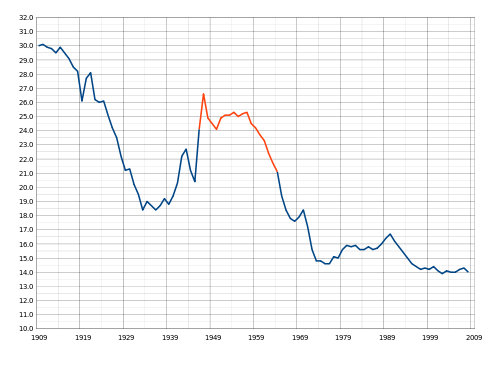Baby boom
A baby boom is any period marked by a greatly increased birth rate. This demographic phenomenon is usually ascribed within certain geographical bounds. People born during such a period are often called baby boomers; however, some experts distinguish between those born during such demographic baby booms and those who identify with the overlapping cultural generations. The causes of baby booms may involve various fertility factors. One common baby boom was right after World War II during the Cold War.
The U.S. birthrate exploded after World War II. From 1945 to 1961, more than 65 million children were born in the United States. At the height of this baby boom, a child was born every seven seconds. Many factors contributed to the baby boom. First, young couples who had put off getting married during World War II and the Korean War could finally begin their families. Also, the government encouraged the growth of families by offering generous GI benefits for home purchases. Finally, popular culture celebrated pregnancy, parenthood, and large families.
Africa
The HIV/AIDS crisis in Africa has contributed locally to a population boom. Aid money used for contraceptives has been diverted over the past two decades into fighting HIV, with the number of babies born far outstripping the deaths from AIDS.[1]
France
France experienced a baby boom after 1945; it reversed a long-term record of low birth rates.[2] The sense that the population was too small, especially in regard to more powerful Germany, was a common theme in the early twentieth century. Put in a list policies were proposed in the 1930s, and implemented in the 1940s.[3][4]
In addition, there was a steady immigration, especially from former French colonies in North Africa. The population grew from 41 million in 1946, to 50 million in 1966, and 60 million by 1990. The farm population declined sharply, from 35% of the workforce in 1945 to under 5% by 2000. By 2004, France had the second highest birthrate in Europe, behind only Ireland.[5][6]
Romania
- Decreţei: (1967-1989), A baby boom in Romania caused by a ban on abortion and contraception.
United States
The term "baby boom" most often refers to the post–World War II baby boom (1946–1964) when the number of annual births exceeded 2 per 100 women (or approximately 1% of the total population size). There are an estimated 78.3 million Americans who were born during this period.[7] The term is a general demographic and is also applicable to other similar population expansions.

Recent baby boom periods include the following:
- Post–World War I baby boom: (1918-1929)
- Post–World War II baby boom: Years of duration vary, depending on the source.
- Echo baby boom (Millennial Generation): (researchers and commentators use birth years ranging from the early 1980s to the early 2000s) are the children of the baby boomers, Gen Xers, and even some members of the Silent Generation.[10][11]
See also
- Baby boomers
- Population boom
- Generation
- Generations (book)
- Population bottleneck
- Death rates in the 20th century
- Agequake (book)
- American social policy during the Second Red Scare
- Post–World War II baby boom
Notes
- ↑ Rosenthal, Elisabeth (14 April 2012). "In Nigeria, a Preview of an Overcrowded Planet". The New York Times.
- ↑ Leslie King, "'France needs children'" Sociological Quarterly (1998) 39#1 pp: 33-52.
- ↑ Marie-Monique Huss, "Pronatalism in the inter-war period in France." Journal of Contemporary History (1990) 25#1 pp: 39-68.in JSTOR
- ↑ Colin L. Dyer, Population and Society in 20th Century France (1978)
- ↑ Colin Jones, Paris: Biography of a City (2004) p 438
- ↑ Gilles Pison, "La population de la France en 2005," Population et Sociétés (March 2006) #421 Online
- ↑ "Baby Boom Population: U.S. Census Bureau, USA and by State". Boomers Life. 2008-07-01. Archived from the original on 5 June 2009. Retrieved 2009-05-18.
- ↑ CDC Bottom of this page http://www.cdc.gov/nchs/products/vsus.htm "Vital Statistics of the United States, 2003, Volume I, Natality", Table 1-1 "Live births, birth rates, and fertility rates, by race: United States, 1909-2003."
- ↑ U.S. Census Bureau — Oldest Boomers Turn 60 (2006)
- ↑ Leung, Rebecca (2005-09-04). "The Echo Boomers". 60 Minutes. CBS News. Archived from the original on 30 August 2010. Retrieved 2010-08-24.
- ↑ Marino, Vivian (August 20, 2006). "College-Town Real Estate: The Next Big Niche?". The New York Times. p. 1. Retrieved September 25, 2010.
College enrollments have been on the rise as the baby boomers' children — sometimes known as the "echo boom" generation — come of age. This group, born from 1982 to 1995, is about 80 million strong.